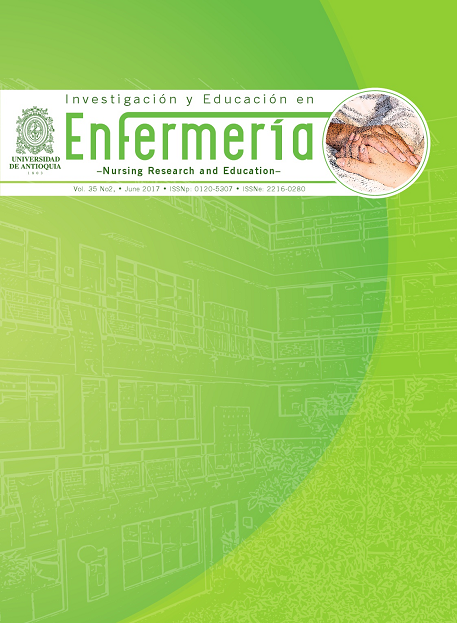Quality of information given to surgical patients with abdominal cancer
DOI:
https://doi.org/10.17533/udea.iee.v35n2a11Keywords:
Abdominal neoplasms, oncology nursing, patient satisfaction.Abstract
Objective. To evaluate the need for information in patients with abdominal neoplasms.
Methods. The sample consisted of 100 patients hospitalized in a surgical ward for patients with abdominal neoplasms at the National Institute of Cancer José de Alencar Gomes da Silva / INCA, in the period between June and December 2016. To collect the data, the Brazilian Portuguese version of the European Organization for Research and Treatment of Cancer (EORTC) information module questionnaire (QLQ-INFO25) was used.
Results. In general, for most items, the patients showed satisfaction with the amount of information received. The items referring to the disease, examinations, treatment and general information stand out, with an average score of more than 80%. For some items, however, there is dissatisfaction with the amount of information received, especially those related to the cause of the disease, aspects of out-of-hospital and home care, different places of care and aspects of self-help, with a satisfaction level of less than 40%.
Conclusion. Despite the high level of satisfaction with the information received, it was observed that almost all patients would like more information, which makes us recommend that, as part of the care, the information offered to these patients about the treatment and the evolutionary process of the disease should be enhanced.
How to cite this article: Silva DGF, de Souza ALLP, Martins TSF, Pedrosa TM, Muzi CD, Guimarães RM. Quality of information given to surgical patients with abdominal cancer. Invest. Educ. Enferm. 2017; 35(2):221-231.
Downloads
References
(1) Instituto Nacional de Câncer José Alencar Gomes da Silva. Estimativa 2016: incidência de câncer no Brasil. Rio de Janeiro: INCA; 2016.
(2) Dóro MP, Pasquini R, Medeiros CR, Bitencourt, MA, Moura GL. O câncer e sua representação simbólica. Psicologia: Ciência e Profissão. 2004; 24(2):120–33.
(3) Neufeld KR, Degner LF, Dick JA. A nursing intervention strategy to foster patient involvement in treatment decisions. Oncol. Nurs. Forum. 1993; 20(4):631–5.
(4) Campos MR, Leal M do C, Jr S, De PR, Cunha CB da. Consistency between data sources and interobserver reliability in the Study on Neonatal and Perinatal Morbidity and Mortality and Care in the City of Rio de Janeiro. Cad. Saúde Pública; 2004; (20):34–43.
(5) Matos MAF. Informação ao doente oncológico. Validação da versão Portuguesa do questionário EORTC QLQ-INFO26 [Internet]. Lisboa: Faculdade de Medicina de Lisboa, Portugal; 2010 [cited 18 Apr, 2017]. Available from: http://repositorio.ul.pt/bitstream/10451/2700/1/603306_Tese.pdf
(6) Arraras JI, Greimel E, Sezer O, Chie W-C, Bergenmar M, Costantini A, et al. An international validation study of the EORTC QLQ-INFO25 questionnaire: an instrument to assess the information given to cancer patients. Eur. J. Cancer. 2010; 46(15):2726–38.
(7) Gilmer JS, Tripp-Reimer T, Buckwalter KC, Andrews PH, Morris WW, Rios H, et al. Translation and validation issues for a multidimensional elderly self-assessment instrument. West J. Nurs. Res. 1995; 17(2):220–6.
(8) Byrt T, Bishop J, Carlin J. Bias, prevalence and kappa. J. Clin. Epidemiol. 1993; 46(5):423-9.
(9) Beaton DE, Bombardier C, Guillemin F, Ferraz MB. Guidelines for the process of crosscultural adaptation of self-report measures. Spine. 2000; 25(24):3186–91.
(10) Arraras JI, Manterola A, Hernández B, Arias de la Vega F, Martínez M, Vila M, et al. The EORTC information questionnaire, EORTC QLQ-INFO25. Validation study for Spanish patients. Clin. Transl. Oncol. 2011; 3(6):401–10.
(11) Mendonça SR, Valadão M, Castro L, et al. A Importância da Consulta de Enfermagem em Préoperatório de Ostomias Intestinais. Rev. Bras. Cancerol. 2007; 53(4):431-5.
(12) Adler J, Paelecke-Habermann A, Janh P, Landenberger M, Leplow B, Vordermark D. Patient information in radiation oncology: a cross-sectional pilot study using the EORTC QLQ-INFO26 module. Radiat. Oncol. 2009; 4: 40.
(13) Ferraz Gonçalves A, Marques A, Rocha S, Leitão P, Mesquita M. Breaking bad news: Experiences and preferences of advanced cancer patients at a Portuguese oncology centre. Palliat. Med. 2005; 19(7):526-31.
(14) Nunes FDBR. Da informação Fornecida ao consentimento informado a doentes oncológicos. [Tese Mestrado em Cuidados Paliativos]. Porto: Faculdade de Medicina, Universidade do Porto; 2012.
(15) Pinto AC, Ferreira-Santos F, dal Lago L, Azambuja E Pimentel FL et al. Information perception, wishes, and satisfaction in ambulatory cancer patients under active treatment: patient-reported outcomes with QLQ-INFO25. Ecancermedicalscience. 2014; (2)8:425.
(16) Bozec A, Schultz P, Gal J, Chamorey E, Chateau Y, Dassonville O et al. Evaluation of the information given to patients undergoing head and neck cancer surgery using the EORTC QLQ-INFO25 questionnaire: A prospective multicentric study. Eur. J. Cancer. 2016;(67):73-82
Downloads
Published
How to Cite
Issue
Section
License
Derechos de propiedad / Direitos de Propriedade
English: If the article is accepted for publication, all copyright will be of exclusive property of Investigación y Educación en Enfermería. The text and the graphics included in the publication are exclusive responsibility of the authors and not necessarily reflect the thought of the Editorial Committee.
Español: Si el artículo es aprobado para publicación, todos los derechos son de propiedad de Investigación y Educación en Enfermería. El texto y las gráficas incluidas en la publicación son de exclusiva responsabilidad de los autores y no necesariamente refleja el pensamiento del Comité Editorial.
Português: Se o artigo for aceito para publicação, todos os direitos autorais serão de propriedade exclusiva de Investigación y Educación en Enfermería. O texto e os gráficos incluídos na publicação são de responsabilidade exclusiva dos autores e não refletem necessariamente o pensamento do Comitê Editorial.















